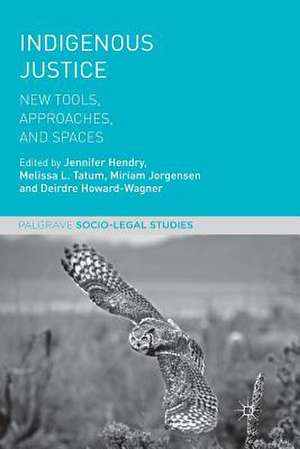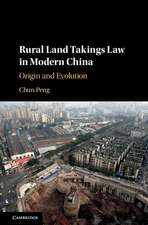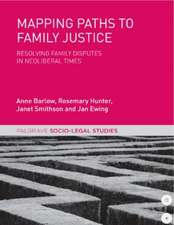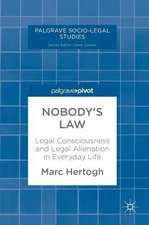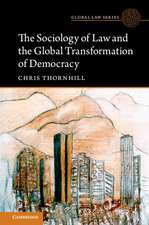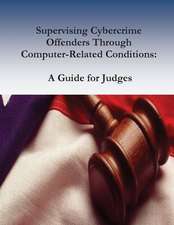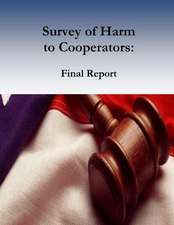Indigenous Justice: New Tools, Approaches, and Spaces: Palgrave Socio-Legal Studies
Editat de Jennifer Hendry, Melissa L. Tatum, Miriam Jorgensen, Deirdre Howard-Wagneren Limba Engleză Paperback – 25 iul 2019
Stemming from an international conference on ‘Spaces of Indigenous Justice’, Indigenous Justice is richly illustrated with case studies and comprises contributions from scholars working across the fields of law, socio-legal studies, sociology, public policy, politico-legal theory, and Indigenous studies. As such, the editors of this timely and engaging volume draw upon a wide range of experience to argue for a radical shift in how we engage with Indigenous studies.
| Toate formatele și edițiile | Preț | Express |
|---|---|---|
| Paperback (1) | 581.65 lei 6-8 săpt. | |
| Palgrave Macmillan UK – 25 iul 2019 | 581.65 lei 6-8 săpt. | |
| Hardback (1) | 730.47 lei 6-8 săpt. | |
| Palgrave Macmillan UK – 19 mai 2018 | 730.47 lei 6-8 săpt. |
Din seria Palgrave Socio-Legal Studies
-
 Preț: 234.50 lei
Preț: 234.50 lei -
 Preț: 197.34 lei
Preț: 197.34 lei -
 Preț: 385.84 lei
Preț: 385.84 lei - 18%
 Preț: 891.96 lei
Preț: 891.96 lei - 15%
 Preț: 580.82 lei
Preț: 580.82 lei - 15%
 Preț: 644.18 lei
Preț: 644.18 lei - 15%
 Preț: 469.91 lei
Preț: 469.91 lei -
 Preț: 424.43 lei
Preț: 424.43 lei - 15%
 Preț: 471.37 lei
Preț: 471.37 lei - 18%
 Preț: 730.47 lei
Preț: 730.47 lei - 15%
 Preț: 572.48 lei
Preț: 572.48 lei - 15%
 Preț: 639.25 lei
Preț: 639.25 lei - 15%
 Preț: 644.95 lei
Preț: 644.95 lei - 15%
 Preț: 643.00 lei
Preț: 643.00 lei - 15%
 Preț: 581.14 lei
Preț: 581.14 lei - 15%
 Preț: 640.88 lei
Preț: 640.88 lei - 18%
 Preț: 788.90 lei
Preț: 788.90 lei - 15%
 Preț: 588.18 lei
Preț: 588.18 lei - 18%
 Preț: 788.72 lei
Preț: 788.72 lei -
 Preț: 200.30 lei
Preț: 200.30 lei - 18%
 Preț: 891.96 lei
Preț: 891.96 lei - 15%
 Preț: 703.06 lei
Preț: 703.06 lei - 15%
 Preț: 703.85 lei
Preț: 703.85 lei -
 Preț: 389.49 lei
Preț: 389.49 lei -
 Preț: 389.88 lei
Preț: 389.88 lei -
 Preț: 445.12 lei
Preț: 445.12 lei -
 Preț: 389.70 lei
Preț: 389.70 lei - 18%
 Preț: 786.84 lei
Preț: 786.84 lei - 15%
 Preț: 644.69 lei
Preț: 644.69 lei - 18%
 Preț: 731.10 lei
Preț: 731.10 lei -
 Preț: 390.63 lei
Preț: 390.63 lei -
 Preț: 291.67 lei
Preț: 291.67 lei - 15%
 Preț: 700.29 lei
Preț: 700.29 lei - 18%
 Preț: 732.70 lei
Preț: 732.70 lei -
 Preț: 234.35 lei
Preț: 234.35 lei -
 Preț: 394.51 lei
Preț: 394.51 lei -
 Preț: 486.21 lei
Preț: 486.21 lei
Preț: 581.65 lei
Preț vechi: 684.30 lei
-15% Nou
Puncte Express: 872
Preț estimativ în valută:
111.29€ • 116.21$ • 91.91£
111.29€ • 116.21$ • 91.91£
Carte tipărită la comandă
Livrare economică 15-29 aprilie
Preluare comenzi: 021 569.72.76
Specificații
ISBN-13: 9781349959228
ISBN-10: 1349959227
Pagini: 232
Ilustrații: XVI, 232 p.
Dimensiuni: 155 x 235 mm
Greutate: 0.35 kg
Ediția:2018
Editura: Palgrave Macmillan UK
Colecția Palgrave Macmillan
Seria Palgrave Socio-Legal Studies
Locul publicării:London, United Kingdom
ISBN-10: 1349959227
Pagini: 232
Ilustrații: XVI, 232 p.
Dimensiuni: 155 x 235 mm
Greutate: 0.35 kg
Ediția:2018
Editura: Palgrave Macmillan UK
Colecția Palgrave Macmillan
Seria Palgrave Socio-Legal Studies
Locul publicării:London, United Kingdom
Cuprins
Chapter 1. Introduction.- Part I: A Look at the Existing System.- Chapter 2. Justice as Position, Justice as Practice; Stephen Cornell.- Chapter 3. Indigenous-State Relationships and the Paradoxical Effects of Anti-discrimination Law; Kirsty Gover.- Chapter 4. Pueblo Water Rights; Darren Modzelewski.- Chapter 5. Human Rights and Neoliberal Wrongs in the Indigenous Child Welfare Space; Teresa Libesman.- Part II: Incorporating Indigenous Laws, Methods, and Practices.- Chapter 6. Tsilhqot’in Nation; Renee Racette.- Chapter 7. Customary Law and Land Rights; Amrita Mukherjee.- Chapter 8. Making Space for Indigenous Justice in the Child Welfare and Protection Context; Sarah Ciftci.- Chapter 9. Taking Justice to Aboriginal People; Deirdre Howard-Wagner.- Chapter 10. Thoughts on the ‘Law of the Land’ and the Persistence of Aboriginal Law in Australia; Wantarri Steve Jampijimpa Patrick and Mary Spiers Williams.- Part III: New Tools and Partnerships.- Chapter 11. Building New Traditions; Jennifer Hendry and Melissa L. Tatum.- Chapter 12. Contestations of Space; Gina D. Stuart-Richard.- Chapter 13. Googling Indigenous Kamchatka; Benedict J. Colombi, Brian Thom, and Tatiana Degai.- Chapter 14. Mana Wahine; Sharon Toi.- Chapter 15. Contemporary First Nation Lawmaking; Miriam Jorgensen
Notă biografică
Jennifer Hendry is an Associate Professor in Law and Social Justice at the University of Leeds School of Law, UK.
Melissa L. Tatum is a Research Professor of Law at the University of Arizona, USA.
Miriam Jorgensen is the Research Director of the Native Nations Institute at the University of Arizona, USA.
Deirdre Howard-Wagner is a Research Fellow at the Centre for Aboriginal Economic Policy Research (CAEPR) at the Australian National University (ANU).
Melissa L. Tatum is a Research Professor of Law at the University of Arizona, USA.
Miriam Jorgensen is the Research Director of the Native Nations Institute at the University of Arizona, USA.
Deirdre Howard-Wagner is a Research Fellow at the Centre for Aboriginal Economic Policy Research (CAEPR) at the Australian National University (ANU).
Textul de pe ultima copertă
This highly topical collection of essays addresses contemporary issues facing Indigenous communities from a broad range of multi- and interdisciplinary perspectives. Drawing from across the social sciences and humanities, this important volume challenges the established norms, theories, and methodologies within the field, and argues for the potential of a multidimensional approach to solving problems of Indigenous justice.
Stemming from an international conference on ‘Spaces of Indigenous Justice’, Indigenous Justice is richly illustrated with case studies and comprises contributions from scholars working across the fields of law, socio-legal studies, sociology, public policy, politico-legal theory, and Indigenous studies. As such, the editors of this timely and engaging volume draw upon a wide range of experience to argue for a radical shift in how we engage with Indigenous studies.
Caracteristici
Proposes a new approach to (re)solving issues of Indigenous justice Draws on fields such as sociology, public policy, law, socio-legal studies and anthropology Considers the work of (activist) academics, and argues for more cooperation between Indigenous communities and academic disciplines
